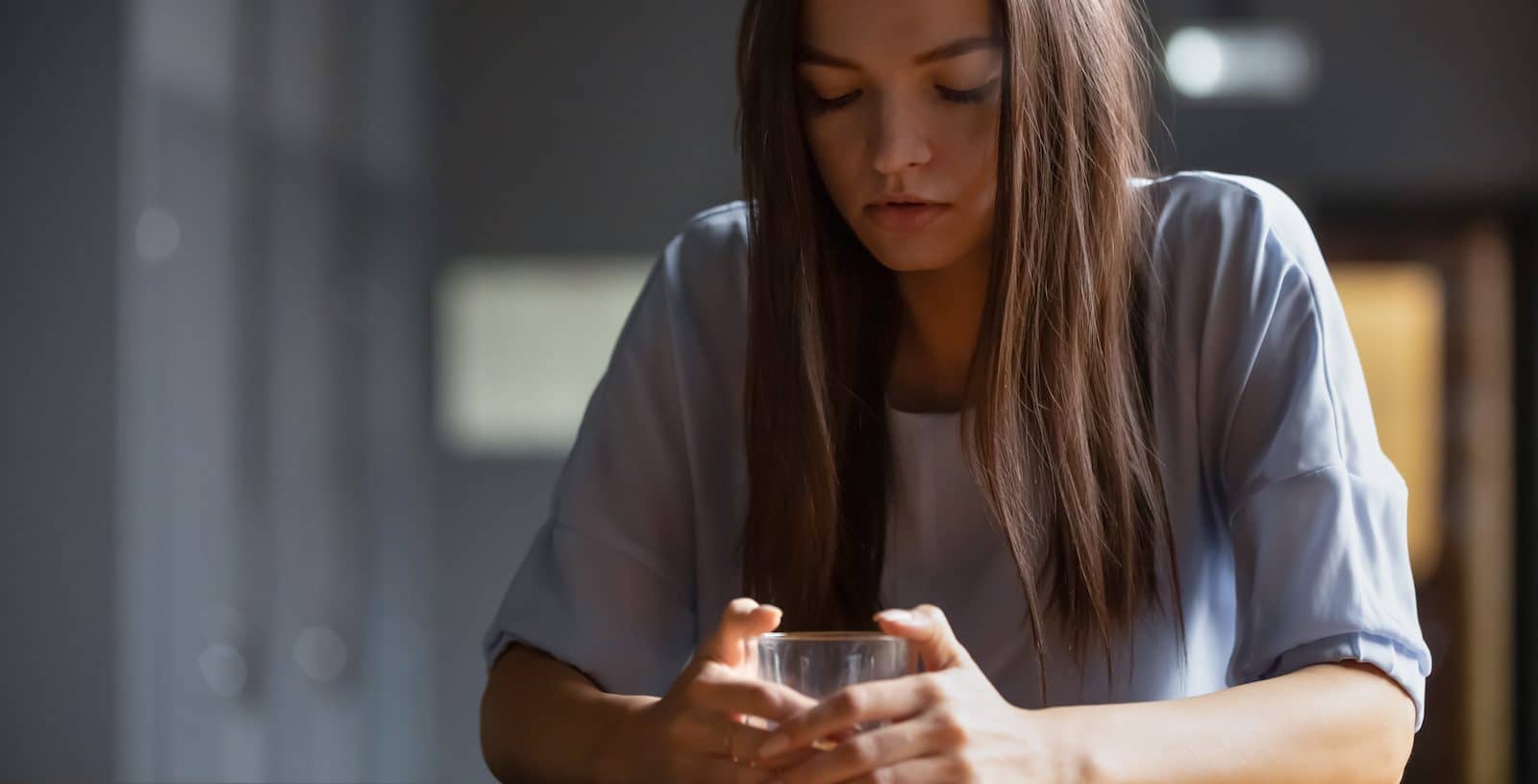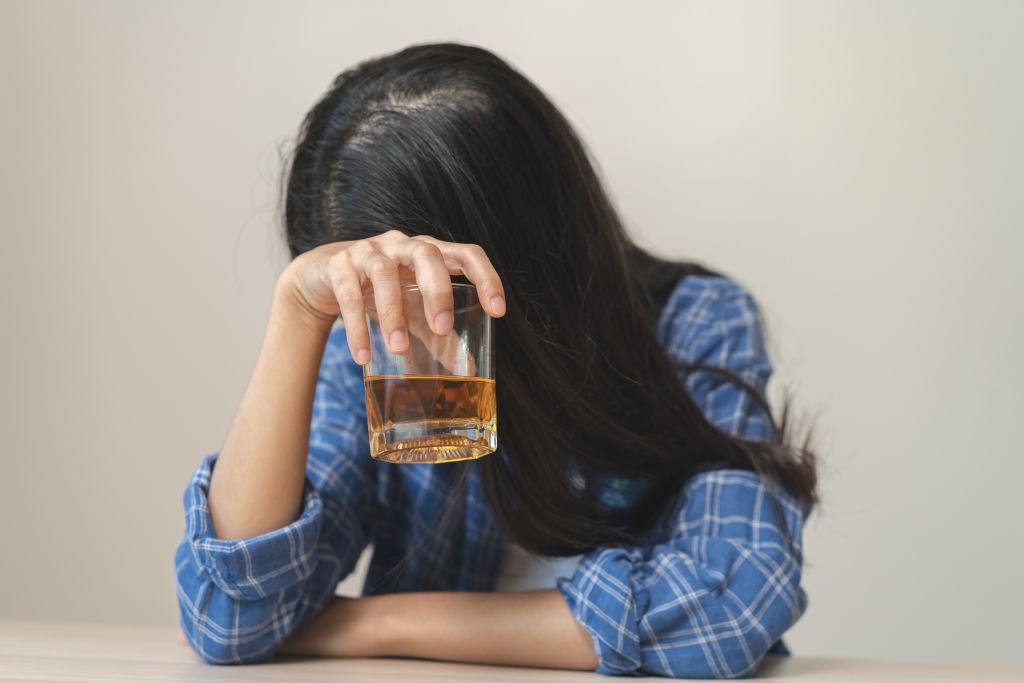Table of Contents
Social situations can be a major source of stress and anxiety for many. Unfamiliar interactions, pressure to maintain a certain image, or navigating challenging relationships can all lead individuals to seek ways to cope. One common method involves using alcohol as a self-medication tool.
While someone might initially turn to alcohol to soothe anxious feelings, the reality is that alcohol abuse and anxiety often create a vicious cycle that worsens both problems. This complex relationship can be difficult to untangle, as it’s not always clear whether anxiety or alcohol abuse comes first.
Someone dealing with anxiety might turn to alcohol for relief, but that relief doesn’t last. Once the effects wear off, anxiety often comes back even stronger, leading to more drinking in an attempt to manage it. This cycle can quickly spiral into a serious struggle with alcoholism and anxiety.
Unraveling the tangled threads of anxiety and alcoholism is key to finding effective treatment. It’s important to take the time to understand the symptoms of anxiety, signs of alcoholism, and how both are linked in order to get comprehensive help for this complex struggle.
Symptoms of Anxiety Disorders
In life, it is common for one to experience stress and anxiety from time to time. Maybe you are going through a major life transition and are uncertain about what the future has in store for you, or you’re nervous about an upcoming event, etc.
However, if you are struggling with anxiety on a more regular, daily occurrence, you may need to seek professional medical help to alleviate the often debilitating effects stress can cause on your mind and body.
To understand if you struggle with anxiety and need medical help, it is important to know the symptoms of experiencing anxiety.
Some common symptoms of anxiety include:
- Nervousness, restlessness, or being tense
- Trembling or muscle twitching
- Insomnia
- Difficulty concentrating on anything other than the thing you are worried about
- Rapid heart rate
- Feelings of danger, panic, or dread
- Rapid breathing or hyperventilation
- Weakness and lethargy
- Increased or heavy sweating
- Obsessions about certain ideas (Obsessive-Compulsive Disorder)
- Anxiety around things that happened in the past (Post-Traumatic Stress Disorder)
- Avoidance of things that trigger stress/anxiety
Some of these symptoms can result in a panic attack if they become more intense. Panic attacks are sudden waves of fear or distress that peak within minutes and include at least four of the symptoms below. Recognizing these symptoms is the first step toward getting the support you need.
Some signs of a panic attack include:
- Sweating
- Palpitations
- Shortness of breath
- Feeling hot or cold
- Sensation of choking
- Fear of losing control
- Chest pains or tightness
- Numbness or tingling sensations (paresthesia)
- Dizziness, light-headedness, feeling faint
- Nausea or gastrointestinal problems
- Shaking or trembling
- Feeling “detached” from oneself or reality
It’s important to consult a doctor if you are experiencing these. They can help you find effective ways to manage stress and prevent future episodes.
Signs of Alcoholism
There are many warning signs of alcohol abuse. However, while many may be easily discerned in oneself, other signs may be difficult to detect.
If symptoms are left untreated for a while, alcohol abuse can spiral out of control and cause devastating effects on yourself and your relationship with others. Therefore, it is essential to be extremely honest with any warning signs you may be experiencing to get the help needed.
Common signs of alcohol abuse may include:
- Feeling a strong urge to drink (craving alcohol)
- Choosing to drink over daily obligations/commitments
- Isolating from friends and family
- Making excuses or becoming defensive about your drinking
- Hiding your drinking from others
- Showing signs of abnormal irritability and mood swings
- Continuing to use alcohol despite being in physically hazardous situations (operating machinery, driving, etc.)
- Using alcohol despite having health complications
This list is in no way an all-inclusive list of signs of alcoholism. So, if you feel you have issues with alcohol abuse, you must seek outside help, either through a medical professional or by attending a treatment facility.
Links Between Anxiety Disorders and Alcoholism
When someone struggles with anxiety as a daily occurrence, the effects can be debilitating.
Anxiety disorders can cause one to seek comfort and relief from their symptoms through unhealthy coping mechanisms, such as drinking alcohol. However, despite trying to control anxiety through drinking, drinking can often worsen anxiety.
Research suggests that heavy drinking can interfere with neurotransmitters in the brain responsible for positive mental health. This can cause someone who struggles with overwhelming stress to spiral downward into further bouts of anxiety.
Because alcohol can temporarily put someone at ease, many people may attribute alcohol’s effects to alleviating stress. Since the effects are short-lived, many people may stay on the hamster wheel of drinking to avoid feeling unpleasant feelings of anxiety.
It’s common to think that the momentary lapse of unpleasant uneasiness brought on by alcohol use will keep them at ease for the long term by continuing to drink.
The reality is that drinking more alcohol will only exacerbate the anxiety in the long run. Research confirms this by proving that people with an alcohol use disorder have higher levels of anxiety than people who do not have an alcohol use disorder.
Whether anxiety disorders drive someone to drink or drinking causes anxiety disorders is unclear. However, more studies are being conducted with results that signify a link between the two and that alcohol does not treat an anxiety disorder.
Reducing alcohol can bring on more feelings of happiness, self-confidence, social functioning, and overall emotional and mental well-being. Therefore, it is crucial that if you struggle with anxiety, you treat it before trying to turn to drugs or alcohol to cope.
How to Cope With Anxiety
For those seeking alcohol and anxiety relief, there are many healthier ways of coping by making some lifestyle changes, such as:
- Practicing meditation practices or yoga
- Getting enough rest
- Spending more time outdoors
- Exercising
- Eating healthy
- Reducing caffeine intake
It may also be beneficial to seek the guidance of a therapist/counselor who can help you pinpoint what provokes your anxiety. Working through what stirs up feelings of stress can help you learn to relax when such feelings arise again.
Furthermore, a trained medical professional may recommend taking recovery-safe medication (non-addictive medication) to help alleviate symptoms often experienced with anxiety.
Anxiety and Addiction
Anxiety and addiction are deeply connected, often making it hard to tell which comes first. But one thing is clear—they fuel each other. That’s why a dual-diagnosis approach, which treats both conditions together, is key to recovery.
Does Anxiety Affect Addiction?
Anxiety can be a major trigger for addiction. Many people turn to alcohol or drugs to ease social anxiety, panic attacks, or general stress. While substances may offer temporary relief, they don’t address the root problem. Instead, reliance on them can quickly turn into dependence, making both the anxiety and addiction worse.
Does Addiction Affect Anxiety?
While substances might seem like a quick fix, they often increase anxiety over time. Dependence leads to withdrawal symptoms that can feel like, or even intensify, anxiety. Plus, the stress of addiction, from financial struggles to relationship issues, can add even more worry, creating a cycle that’s hard to break.
What to Do if You Struggle with Anxiety and Alcoholism: Dual Diagnosis Alcohol Treatment
As mentioned previously, you must seek the guidance of a trained medical professional if you are struggling with anxiety disorders and alcohol abuse.
It could also benefit you if you seek help through an inpatient/intensive outpatient drug rehab specializing in dual-diagnosis treatment. This type of treatment addresses both alcoholism and anxiety, not just one or the other. That way, you can rest assured that regardless of anxiety-induced alcoholism or alcoholism-induced anxiety, you are being taken care of through a holistic, well-rounded plan.
In addition to the dual-diagnosis treatment through an alcohol treatment center, participating in counseling with a therapist in the program can help ensure that you approach your care plan with a holistic approach.
It may feel overwhelming to figure out on your own. Thankfully, there are inpatient/intensive outpatient alcohol rehab centers that put together an individualized, all-inclusive treatment plan for you based on your own unique needs.
If you’re struggling with addiction to alcohol or opiates, Infinite Recovery can help. We offer personalized detox programs in Houston, Austin, and across Texas, designed to support your journey toward mental, physical, and emotional well-being.
Don’t wait any longer to invest in your future. Take the first step towards a life of lasting happiness and freedom today and reach out today. Your future self will thank you for it.
Sources:
Infinite Recovery has strict sourcing guidelines and relies on peer-reviewed studies, academic research institutions, and medical associations for our references. We avoid using tertiary references as our sources. You can learn more about how we source our references by reading our editorial guidelines and medical review policy.
- Cirino E. Anxiety: Symptoms, Types, Causes & More. Healthline. Published September 16, 2018. Accessed July 5, 2022. https://www.healthline.com/health/anxiety-symptoms
- Fields L. Hyperventilation: Symptoms, Causes, Treatment. WebMD. Published October 29, 2021. Accessed July 5, 2022. https://www.webmd.com/lung/lung-hyperventilation-what-to-do
- Mayo Clinic Staff. Obsessive-compulsive disorder (OCD) – Symptoms and causes. Mayo Clinic. Published March 11, 2020. Accessed July 5, 2022. https://www.mayoclinic.org/diseases-conditions/obsessive-compulsive-disorder/symptoms-causes/syc-20354432
- Mayo Clinic Staff. Post-traumatic stress disorder (PTSD) – Symptoms and causes. Mayo Clinic. Published July 6, 2018. Accessed July 5, 2022. https://www.mayoclinic.org/diseases-conditions/post-traumatic-stress-disorder/symptoms-causes/syc-20355967
- Ansorge R. Heart Palpitations: Causes, Treatments, After Eating, Lying Down. Published July 20, 2021. Accessed July 5, 2022. https://www.webmd.com/heart-disease/guide/what-causes-heart-palpitations
- National Institute of Neurological Disorders and Stroke. Paresthesia | National Institute of Neurological Disorders and Stroke. Published May 4, 2022. Accessed July 5, 2022. https://www.ninds.nih.gov/health-information/disorders/paresthesia
- Smith JP, Randall CL. Anxiety and Alcohol Use Disorders. Alcohol Res. 2012;34(4):414-431.
- McCaul ME, Hutton HE, Stephens MAC, Xu X, Wand GS. Anxiety, Anxiety Sensitivity, and Perceived Stress as Predictors of Recent Drinking, Alcohol Craving, and Social Stress Response in Heavy Drinkers. Alcoholism: Clinical and Experimental Research. 2017;41(4):836-845. doi:10.1111/acer.13350

















